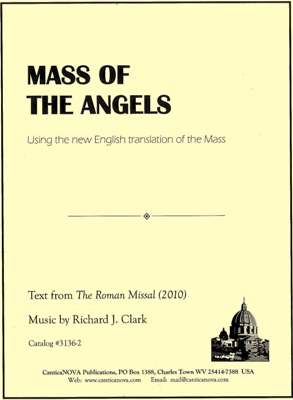
 HILE STRIVING FOR the ideal in liturgy we also deal in the real world with real people. This makes our work challenging yet all the more rewarding as we edge closer and closer toward singing the mass and toward more reverent liturgy—nurturing both exterior and interior prayer. By this we hope to achieve what Saint Pius X states as the purpose of the liturgy: “…the Glory of God and the edification and sanctification of the faithful.” (Tra le Sollecitudini, General principles §1)
HILE STRIVING FOR the ideal in liturgy we also deal in the real world with real people. This makes our work challenging yet all the more rewarding as we edge closer and closer toward singing the mass and toward more reverent liturgy—nurturing both exterior and interior prayer. By this we hope to achieve what Saint Pius X states as the purpose of the liturgy: “…the Glory of God and the edification and sanctification of the faithful.” (Tra le Sollecitudini, General principles §1)
We are but imperfect in our frail humanity, and to achieve such goals we rely on God and each other! With choirs resuming recruitment and rehearsals, many are searching for new resources and direction. Some mainstream resources are geared towards maximizing market share; there are a number of others, perhaps lesser known that have the above words of St. Pius X and Sacrosanctum Concilium in mind. Therefore, this week, the writers of “Views” intend to shine the light not only on their own wonderful work but also on resources that your choir may find useful, affordable, and in many cases free.
 OR ANY CHOIR ASKING THE QUESTION, “WHERE DO I BEGIN?” A great starting point is the astoundingly comprehensive Liturgical Planning pages of CanticaNOVA Publications. Senior Editor Gary Penkala has compiled lists of resources and suggested music for every Sunday and feast day of the liturgical calendar for the Novus Ordo.
OR ANY CHOIR ASKING THE QUESTION, “WHERE DO I BEGIN?” A great starting point is the astoundingly comprehensive Liturgical Planning pages of CanticaNOVA Publications. Senior Editor Gary Penkala has compiled lists of resources and suggested music for every Sunday and feast day of the liturgical calendar for the Novus Ordo.
A typical index for any given Sunday or feast day will list suggested settings in order of priority. Listed first are the official texts of the mass to be sung, i.e., the propers and the ordinary. For example, the Twentieth Sunday in Ordinary Time (A) lists multiple options for the Introit, Gradual/Responsorial Psalm, Alleluia, Offertory, and Communion. This includes Gregorian chant from the Graduale Romanum to various settings in English including those composed by the likes of Bartlett, Motyka, Oost-Zinner, Tietze, Rice, Ostrowski, etc. Links are provided to various sources. Some resources are free and some are available through CanticaNOVA Publications.
 NLY AFTER THE PROPERS AND THE ORDINARY will you find suggestions for hymns and choral anthems. You can be certain that the hymns listed are theologically sound! For organists, there is a comprehensive list of organ repertoire suitable for preludes and postludes, etc.
NLY AFTER THE PROPERS AND THE ORDINARY will you find suggestions for hymns and choral anthems. You can be certain that the hymns listed are theologically sound! For organists, there is a comprehensive list of organ repertoire suitable for preludes and postludes, etc.
At the bottom, you will always find very useful the “Liturgical Hints and Ideas.” For example, he discusses and provides links for general sources of the propers for what is described as “Real and authentic Catholic liturgical music.”

Finally, I offer a sampling of my own resources. Some are published with CanticaNOVA, some are free, and other published with RJC Cecilia Music.
* * Mass of the Angels • CanticaNOVA Publications
* * Mass in Honor of Pope Saint John Paul II • Free Download – Corpus Christi Watershed
* * Sacred Choral Works • RJC Cecilia Music
* * Chant Based Organ Works • RJC Cecilia Music
7-part series: “Important Resources for Liturgical Reform”

